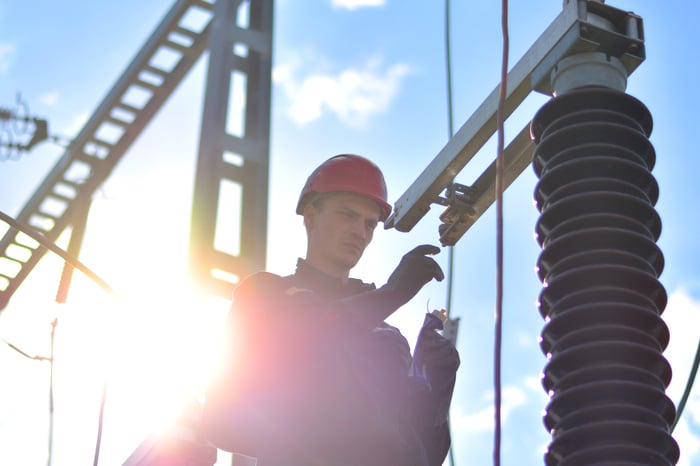The most important thing that a utility does is provide reliable energy to its customers. That's a big problem for utilities in the Northeast, where fuel constraints are causing problems for utilities like Consolidated Edison (ED 0.73%) and National Grid (NGG -0.09%). But the truth is, the fuel issues that are hitting Northeastern utilities today are likely to be good for business over the longer term ... here's why.
The problem
As regulators push utilities toward reducing carbon emissions, utilities across the country have started to shift from a reliance on coal to natural gas. Natural gas, which is cleaner-burning than coal, is being used as a transition fuel to facilitate the ultimate goal of increasing the use of renewable power like solar and wind.

Image source: Getty Images
Natural gas is plentiful in the United States thanks to the growth in fracking, a drilling method that has vastly expanded the country's energy production. But that's a big picture view; moving natural gas from where it is drilled to where it gets used is another story. The Northeast is increasingly using natural gas, but it doesn't have enough pipelines bringing the fuel in to support all the demand. In fact, Con Ed was forced to stop accepting applications from residents wishing to switch from using oil to natural gas for heating their homes. The reason was a little frightening -- it couldn't be sure that it would be able to supply the increased demand, particularly during demand peaks. National Grid did the same thing.
These moves are contentious and have resulted in political spats. National Grid, for example, backed off its application ban after an ugly fight with New York's governor. The company ended up paying a fine (which the company hinted was related to not providing enough customer notice) and said it had found ways around the problem. That last bit is important, because the "ways around" the problem include things like infrastructure investment. Con Ed has also agreed to end its moratorium on new hookups, but not until 2023.
This is big
The Northeast's natural gas access problems are so bad that the grid operator for New England (which is comprised of Connecticut, Maine, Massachusetts, New Hampshire, Rhode Island, and Vermont) recently highlighted the issue. It said that New England will be "energy constrained" because of its increasing reliance on natural gas coupled with limited access to the fuel. And yet it expects the reliability of the grid it oversees to improve over the next decade because of roughly $1.3 billion in planned capital spending.
The thing about utilities is that they are granted monopolies in the regions they serve in exchange for government regulation. If they want to raise rates, they have to go to regulators and ask for permission. It's a long and difficult process and "because we want to make more money" isn't a good enough reason. Utilities need to show that they are spending on their assets to ensure sustainable and reliable operations. If they can do that, then rate hikes are generally approved. The spending that the New England grid operator is talking about is the very kind that is likely to persuade regulators to approve rate hikes.
To put some numbers on this, Eversource Energy (ES -0.53%), which serves customers in four of the six New England states, plans to spend roughly $2.4 billion a year on capital investments between 2020 and 2023. The vast majority of that is earmarked for transmission, distribution, and solar assets. Con Ed, which serves customers in and around New York City, has plans to spend a little under $4 billion a year in 2020 and 2021. Most of that spending is going toward its electricity (it largely owns and operates transmission assets, not generating assets) and natural gas distribution businesses. Spending in the Northeast at National Grid, which has operations in various U.S. markets and in the U.K., isn't as easy to pin down, but the agreement it made with New York's governor suggests that it, too, will be putting material cash to work in ways that regulators will find agreeable.
What each company is spending on varies, of course. The list, however, includes investments in renewable power and conservation, as well as upgrading existing assets so they are more efficient and reliable. This type of spending is generally viewed favorably by regulators, and it will help reduce the effect of the natural gas constraints currently facing the region. That is a long-term win/win situation, even if the near-term concerns about access to natural gas linger for a few years.
Not so bad after all
Utilities are generally considered boring investments because they are considered reliable and safe. However, the changing shape of power in the United States, and particularly the Northeast, has upended this assessment to some extent. Utilities are facing big, industry-altering issues that have to be addressed. There are risks, such as falling short of reliability expectations (a major no-no as far as regulators are concerned) and the need to spend heavily on capital investments to ensure that doesn't happen. The natural gas supply constraints in the Northeast have brought the issue into public view.
However, this also presents opportunities for utilities because the only way to fix the problem is to spend more money. This should, in turn, lead to regulator-approved rate hikes. Those rate hikes should then translate into improved earnings and rising dividends. The process of change may be ugly (note the spat with New York State's governor), but the outcome should be a good one for investors. So look past the bad news in the Northeast, there are very clear silver linings on these dark clouds.






